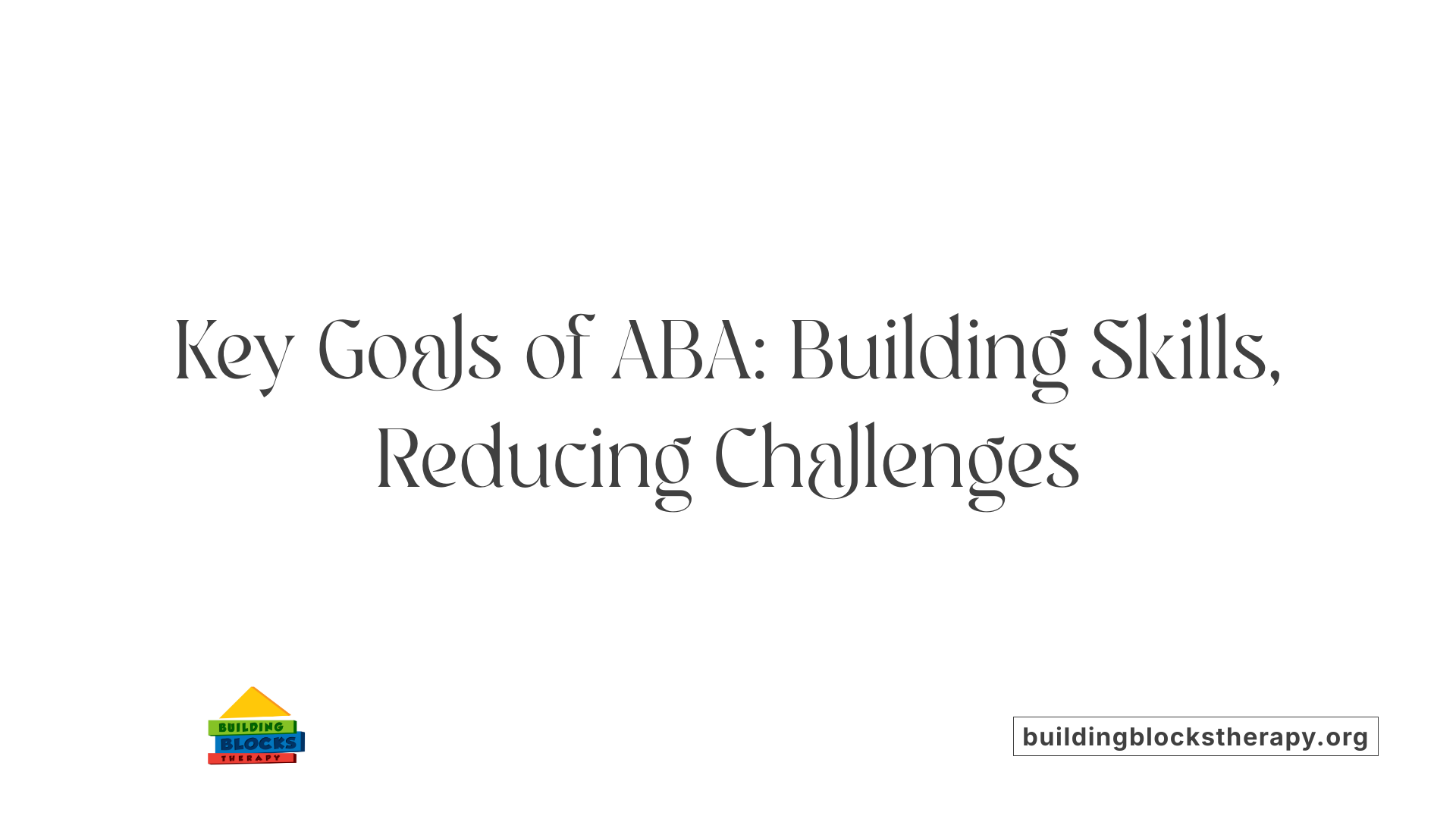Understanding ABA Therapy and Its Impact on Autism
Applied Behavior Analysis (ABA) therapy is a scientifically validated approach designed to support individuals with autism by promoting positive behavioral changes and skill acquisition. This form of therapy utilizes structured interventions based on behavioral science principles, aiming to enhance communication, social interaction, and adaptive skills while minimizing challenging behaviors. Consistency in ABA therapy programs plays a pivotal role in maximizing outcomes, fostering stability, and ensuring steady progress for children on the autism spectrum.
What is ABA Therapy and Who Provides It?

What is Applied Behavior Analysis (ABA) therapy and how is it used to support individuals with autism?
Applied Behavior Analysis (ABA) therapy is a scientifically-supported approach designed to improve meaningful behaviors in individuals with autism. It focuses on teaching new skills and reducing harmful or challenging behaviors using principles rooted in behavioral science. Therapists use systematic interventions such as positive reinforcement, structured routines, and discrete trial training to help children develop communication, social interaction, self-help, and academic skills. ABA programs are customized to each child’s unique needs and progress, ensuring interventions are both effective and personalized. Starting ABA early and maintaining consistent, intensive therapy over time can lead to significant developmental gains and greater independence.
Who typically provides ABA therapy services and what qualifications do these professionals have?
ABA therapy is delivered by qualified professionals including Board Certified Behavior Analysts (BCBAs), licensed therapists, and specialists trained in behavioral analysis. These experts generally hold advanced degrees in applied behavior analysis or related fields and have completed extensive supervised experience, often amounting to 1,500 to 2,000 hours. Certification by the Behavior Analyst Certification Board (BACB) is required, alongside state licensing for legal practice. Providers work in diverse settings such as clinics, schools, hospitals, and community organizations. Their role covers assessment, personalized treatment planning, therapy delivery, caregiver training, and progress monitoring, all aimed at improving key social, communication, and adaptive skills for individuals with autism.
Core Goals and Outcomes Achieved Through ABA Therapy

What are the common goals and outcomes of ABA therapy for people with autism?
ABA therapy focuses on improving crucial skills such as communication, social interaction, and daily living abilities while reducing challenging behaviors. These goals target enhancing independence and adaptive functioning to promote an improved quality of life.
Improving Communication and Reducing Challenging Behaviors
Effective ABA interventions help children develop both verbal and non-verbal communication skills. Consistent therapy sessions apply behavior modification techniques that reduce problem behaviors and promote positive alternatives. This structured approach encourages learning through predictable routines, making it easier for children to adapt and apply new skills across environments.
Typical Outcomes: Enhanced Independence and Social Skills
Through individualized and ongoing support, ABA therapy helps children gain self-help skills and initiate social interactions. This contributes to smoother transitions, better peer engagement, and greater participation in educational and daily life activities. Consistent sessions also facilitate generalization, allowing children to use what they learn at home, school, and other settings.
The Role of Individualized and Early Intervention
Tailored programs matching a child's unique needs and continuous progress monitoring maximize the effectiveness of ABA. Early and intensive interventions often yield more significant developmental gains, especially when parents are actively involved. Such personalized care ensures goals remain relevant and achievable, adapting to the child's evolving abilities.
Overall, while ABA therapy shows medium effects on cognitive and adaptive skills, its success varies based on individual factors and treatment implementation. Nonetheless, it remains a widely endorsed method demonstrating positive impacts on the developmental trajectory of children with autism.
The Role of Consistency in Skill Acquisition and Retention

Importance of Predictable Routines in Therapy
Predictable routines in ABA therapy sessions are essential for creating a stable learning environment. Children with autism benefit greatly from having structured and repetitive activities scheduled regularly. This stability reduces anxiety and stress, allowing children to feel more secure and engaged during therapy. When sessions follow a consistent timetable with familiar routines, children are more likely to remain calm and attentive, which promotes effective learning and retention of skills.
How Consistent Application of Behavioral Principles Supports Learning
Applying behavioral principles uniformly across therapy sessions is crucial for mastering new skills. Consistency in using prompts, reinforcements, and behavioral interventions allows children to clearly understand what is expected of them and what behaviors will be rewarded. This predictability helps children recognize and internalize desired behaviors more quickly and fosters skill generalization across different settings such as home, school, and community environments.
Effect of Routine in Reducing Stress and Anxiety
A structured routine reduces unpredictability, which is often a significant source of stress for children with autism. Consistent therapy schedules and protocols create an environment where children can anticipate what will happen next, minimizing confusion and behavioral challenges. Lower stress levels enable children to focus better on learning tasks, thereby supporting successful acquisition and retention of skills. In sum, routine predictability fosters a safe space that encourages positive behaviors and steady progress.
Consistency Enhancing Generalization and Behavior Management
How Does Consistency Support Generalization of Skills Across Different Environments?
Consistency in ABA therapy helps children transfer skills from therapy sessions to real-life settings such as home, school, and community. By applying the same teaching principles, prompts, and reinforcement strategies uniformly, children more easily recognize and adapt to new skills in various environments. This predictable approach promotes confidence and independence by encouraging the child to use learned behaviors beyond sessions, increasing practical success in daily life.
What Role Do Consistent Prompts and Reinforcements Play in Skill Development?
Using consistent prompts and reinforcements ensures that children receive clear and stable signals about which behaviors are desired and which are not. This uniformity reduces confusion and helps children anticipate outcomes for their actions, fostering quicker skill acquisition. When prompts and rewards are applied consistently, children can gradually reduce dependence on assistance, mastering new skills through predictable encouragement.
How Does Consistency Help Manage Challenging Behaviors?
Stable and predictable routines created by consistent ABA therapy provide children with autism a secure environment, reducing anxiety that might trigger problem behaviors. By maintaining structured therapy sessions and applying clear behavioral strategies, therapists help children understand behavioral expectations and consequences. This consistency is especially important following disruptions, such as transitions or breaks, as it supports smoother behavior regulation and increases cooperation.
Building Therapeutic Relationships and Family Involvement Through Consistency

Benefits of Maintaining the Same Therapist-Child Pairing
Maintaining a consistent therapist-child pairing is essential for fostering a strong, trusting relationship. This continuity allows therapists to deeply understand each child's unique needs and behaviors, creating a more tailored and effective intervention plan. Familiarity between the therapist and child enhances engagement and comfort, which accelerates skill acquisition and reduces anxiety during sessions. Additionally, consistent therapist assignments improve the accuracy of behavior tracking and data collection, allowing adjustments to be made promptly to optimize progress.
Parental Involvement in Consistent Therapy Sessions
Regular and consistent ABA therapy sessions encourage active parental participation. When therapy occurs predictably, caregivers have opportunities to observe techniques and progress, making it easier to reinforce learned behaviors at home. Through involvement in therapy sessions, parents gain practical knowledge and confidence in applying ABA strategies, contributing significantly to their child's development. Furthermore, consistent scheduling reduces family stress by establishing clear routines that fit within household dynamics.
Communication and Training to Support Home Routines
Effective communication between therapists and families is crucial to maintain consistency outside of therapy sessions. Regular updates and collaborative training empower parents to use similar behavioral interventions and visual schedules at home. By standardizing approaches in the household, children experience a cohesive learning environment that strengthens skill generalization across settings. This alignment also supports managing challenging behaviors and reinforces predictable routines, which provide children with autism a sense of security and stability necessary for learning and growth.
Long-Term Benefits and Practical Strategies to Maintain Consistency

Effects of regular sessions on long-term independence and quality of life
Consistent ABA therapy offers profound long-term benefits. By maintaining regular sessions, children with autism are better able to master essential skills that enhance their independence, academic success, and social relationships. This consistent support also fosters improved communication, self-help abilities, and social interactions, laying a foundation for richer participation in educational, social, and vocational activities later in life. Ultimately, children experience a higher quality of life due to these sustained improvements.
Scheduling, therapist matching, and staff training importance
Asteri Treatment Center highlights the importance of structured scheduling, thoughtful therapist matching, and ongoing staff training in promoting consistency. Regularly scheduled therapy sessions reduce anxiety by establishing predictable routines that children can rely on. Matching the same therapist with a child builds a trusting relationship, which is crucial for effective engagement and accurate progress tracking. Additionally, continuous professional development for staff ensures that therapy techniques remain effective and tailored to the child's evolving needs.
Practical tips for families to support consistency at home and prevent regression
Families play a pivotal role in maintaining ABA consistency. Establishing predictable home routines using visual schedules and responding uniformly to behaviors reinforces therapy gains. Applying techniques learned from therapists at home helps prevent skill regression, especially during transitions like summer breaks or school changes. Encouraging parental involvement through regular communication with therapists enhances progress and reduces stress for both children and caregivers. By collaborating closely with therapy teams and maintaining consistency beyond sessions, families support sustained development and smoother adjustments for their children.
Conclusion: The Vital Contribution of Consistency to ABA Therapy Success
Consistency is a cornerstone of effective ABA therapy, underpinning skill mastery, behavioral improvements, and the overall developmental trajectory for children with autism. Through stable routines, uniform application of behavioral principles, and a trusted therapist-child relationship, consistent ABA programs create environments where learning becomes predictable and engaging, reducing anxiety and fostering progress. Equally, family involvement and adherence to structured schedules support the generalization of skills into daily life, enhancing the independence and social integration of individuals. The long-term gains achieved through sustained, consistent therapy emphasize its critical role in optimizing outcomes, enabling children with autism to reach their full potential across educational, social, and personal domains.
References
- The Importance of Sticking to Consistent ABA Therapy
- The Importance of Consistency in Autism Therapy
- Direct ABA Therapy: Why Consistency Is Key to Better ...
- The 6 Benefits of Consistent ABA Therapy
- 8 Reasons to Prioritize ABA Therapy: Consistency is Key
- The Importance of Sticking to Consistent ABA Therapy
- How to Become an Applied Behavior Analyst (ABA) Therapist






